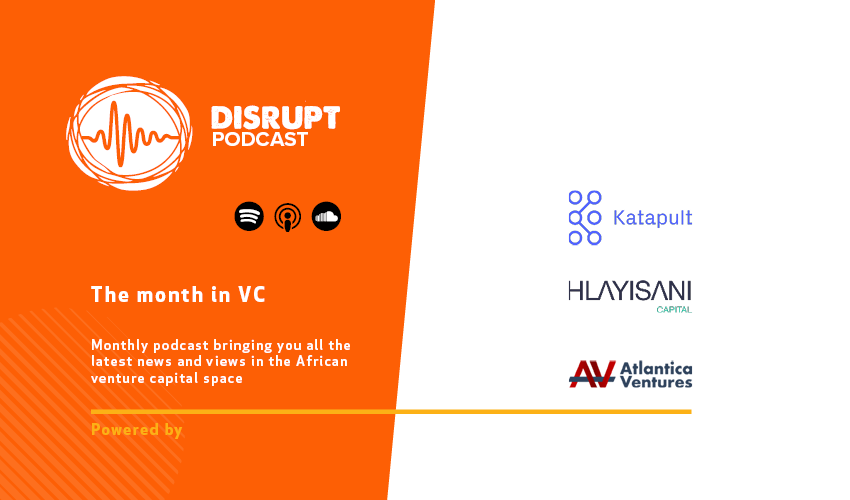You’re a founder looking for venture capital in Africa – how do you do it? Is it worth the cold email, filling out the contact form on the VC’s homepage, or is it more about who you know, or whether you’ve been profiled by Disrupt Africa?
Well, it’s a bit of all of that, apparently. In episode 10 of Disrupt Africa’s “The month in VC” podcast series, released in partnership with Katapult Africa, Hlayisani Capital, ARM Labs Lagos Techstars Accelerator, and Atlantica Ventures, we chatted to our investor friends about how they go about sourcing their portfolio companies.
IK Kanu, founding partner at Atlantica Ventures, says the way Atlantica goes about it is two-fold.
“We develop our thesis in terms of let’s say regions or sectors, or different business models, and then we actually go out there and search. Try to figure out who’s built what there, who’s building something adjacent to it, who is the potential customer to these companies… and then through our network try to figure out who are the folks that are trying to build certain things or have these different ideas,” he said.
“And using our network of startups that we’ve invested in, and even startups that we haven’t invested in but we’ve actually maintained a good relationship with, just reaching out to them and just having that conversation to see if they have any ideas, and just starting speaking to different folks that area.”
Atlantica, though, is also than open to incoming opportunities, via the contact form on their website or by reaching out to to them on LinkedIn.
“You know, they’ve probably heard us speak at different places, heard about us from different portfolio companies, and they just reach out to us and just say “hey, you know we have this this idea that we’re working on; this company that we’re building that seems to fit within your thesis”. So we’re open to either; we actually are active outbound and we take a lot of inbound as well.”
Often, though, getting introduced by a trusted member of their network can be the best way.
“It carries more weight. It makes the filtering a little bit easier, because for any new opportunity we always have to then do our own due diligence, and speak to people to see if there are recommendations from people that you know you or any red flags,” Kanu said.
Brett Commaille, partner at South African VC firm Hlayisani Capital, agrees that an introduction from someone you know carries significant weight.
“There’s something quite critical when someone you know who spent time with the company and backs them frames you and says “you really need to pay attention to this; it’s worth listening to; it’s worth meeting with the founders”. And I think that always going to get your attention,” he said. “And those inevitably are the deals that prove to be worth doing.”
Getting out into the ecosystem is also important.
“One of the critical things that we all do – and it’s about building the ecosystem – is getting out into the market and doing occasional conferences, giving talks so we make sure that we’re visible and available in the industry. So we get a lot of people who will come up to us or who will email us,” Commaille said.
It is necessary to find a balance between being at events, actively seeking startups to invest in, and doing desk research.
“It’s hard to actually go to a lot of the different conferences, just given the commitments you have with travel with the different companies, and also even having a family. So we spend a good amount of time reading up online, and just trying to follow what’s happening in the ecosystem – who’s doing what – and then making the connections from that,” said Kanu.
“I’ll say it’s probably close to maybe 60-70 per cent of our time that is spent doing it virtually, doing it digitally, and trying to get that much information out there, and the rest of the time is just meeting and greeting as much as we can. We try to balance the two.”
Commaille says deck research is important, and can have real value, but sieving out the noise is important.
“I think it’s a natural part of your interest in your sector, that you look at the news, you look at the publications you follow, the interesting stories… You know then who’s the new competition, and who’s doing this in other sectors,” he said.
“But there’s also just a tonne of noise, and so one has got to be quite careful. Otherwise obviously you’re not going to do your job.”
How actively a VC engages in sourcing startups depends on the stage of the fund.
“We are very early into our fund deployment cycle, so we have years left in terms of our investment period,” said Kanu.
“So it’s been a good amount of time actively sourcing and meeting different companies. But we also do have a very active portfolio, and as active investors we like spending time with them and trying to help them as much as we can. Right now, I’ll say we’re probably more skewed towards pipeline development. About 60 per cent in terms of building the pipeline and sourcing, and 40 per cent of our time is spent on managing the portfolio.”


